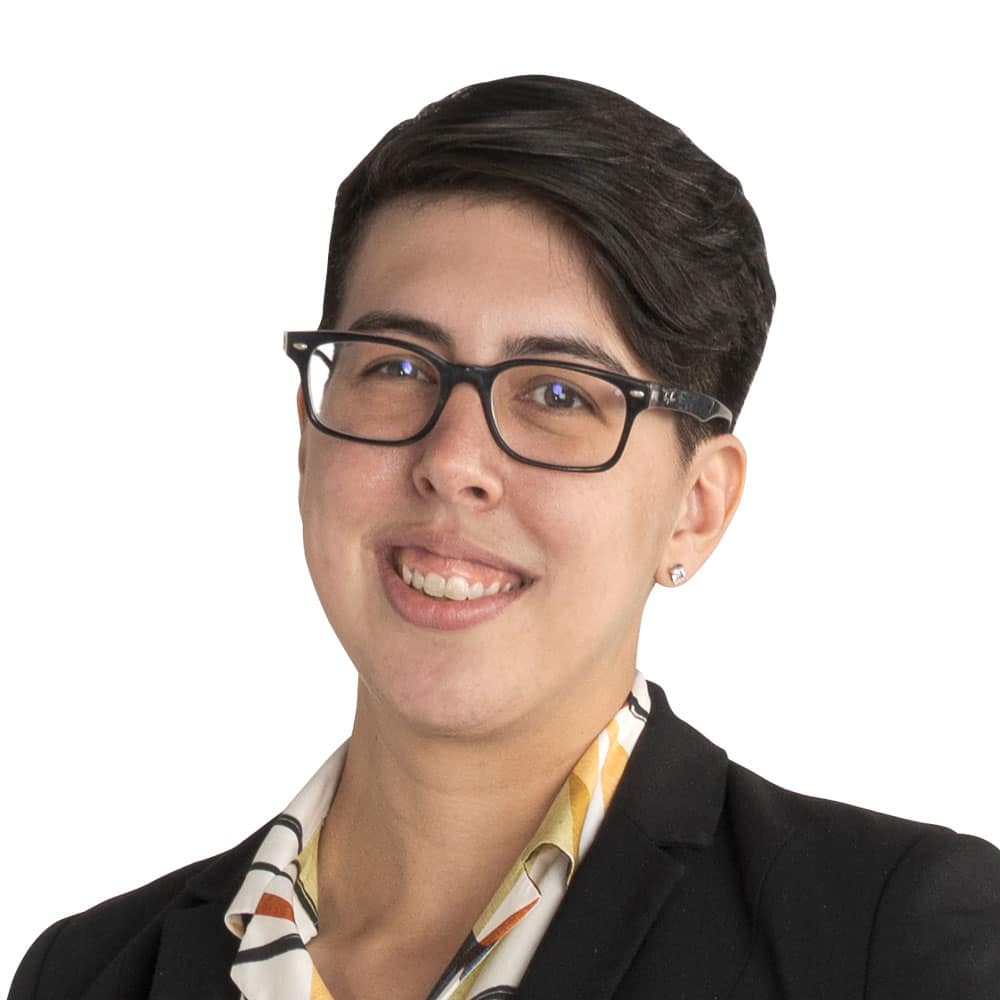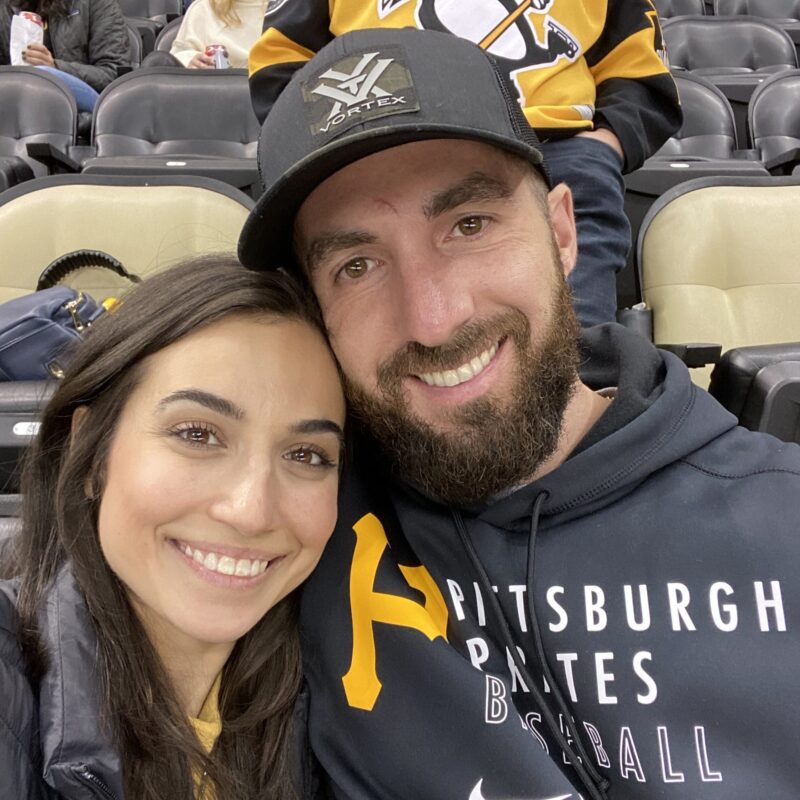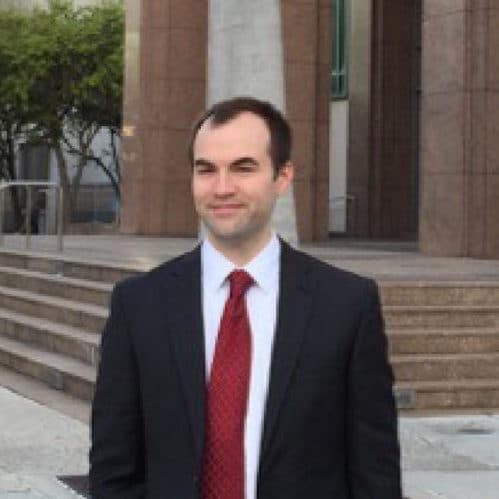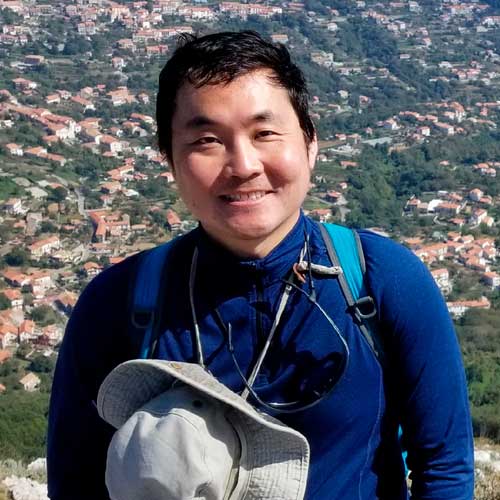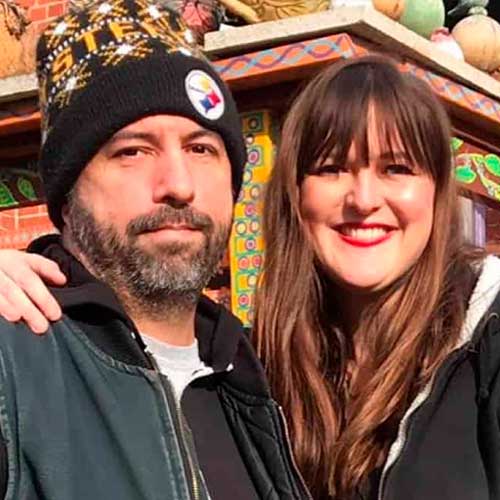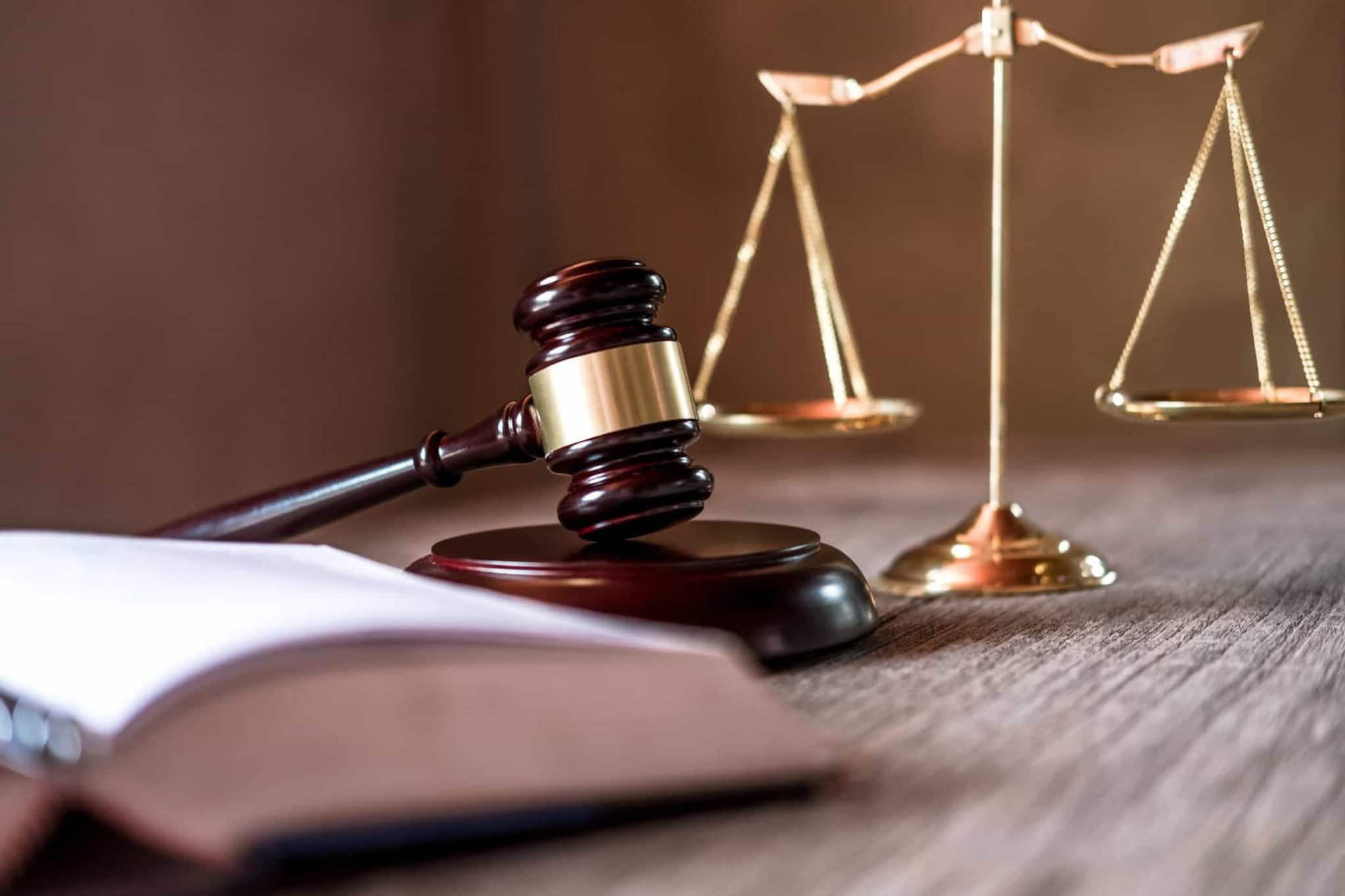Lynch Carpenter LLP Looking to Help 93,000 Individuals Affected by Activate Healthcare, LLC Data Breach
PITTSBURGH, July 05, 2023 (GLOBE NEWSWIRE) -- Activate Healthcare, LLC recently announced that it suffered from a cybersecurity attack on April 27, 2023 that impacted approximately 93,000 individuals personal information. The information potentially impacted in the breach included: name, Social Security number, date of birth, address, driver’s license number, and clinical information, such as provider names, dates of service, and diagnoses.
Lynch Carpenter, LLP is investigating claims against Activate Healthcare, LLC related to this data breach. If you are a current or former patient of Activate Healthcare, you may be entitled to compensation.
If you have received a notification from Activate Healthcare that your information was impacted, please call Patrick Donathen at (412) 322-9243, email him at patrick@lcllp.com, or fill out our contact form at www.lynchcarpenter.com/contact.
About Lynch Carpenter
Lynch Carpenter is a national class action law firm with offices in Pennsylvania, California, and Illinois. Our firm has represented millions of clients in data privacy matters for more than a decade and has earned national acclaim for complex litigation for plaintiffs across the country. To learn more, please visit www.lynchcarpenter.com.
Lynch Carpenter LLP Investigates Claims In Imagine360, LLC Data Breach
PITTSBURGH, July 05, 2023 (GLOBE NEWSWIRE) -- Imagine 360, LLC recently announced that it suffered from a cybersecurity attack on January 28, 2023 that impacted approximately 113,000 individuals personal information. The information potentially impacted in the breach included: names, medical information, health insurance information, and Social Security Numbers.
Lynch Carpenter, LLP is investigating claims against Imagine360, LLC related to this data breach. If you are a current or former member of Imagine360, you may be entitled to compensation. If you have received a notification from Imagine360 that your information was impacted, please call Patrick Donathen at (412) 322-9243, email him at patrick@lcllp.com, or fill out our contact form at www.lynchcarpenter.com/contact.
About Lynch Carpenter
Lynch Carpenter is a national class action law firm with offices in Pennsylvania, California, and Illinois. Our firm has represented millions of clients in data privacy matters for more than a decade and has earned national acclaim for complex litigation for plaintiffs across the country. To learn more, please visit www.lynchcarpenter.com.
LAWSUIT UPDATE - In re Folgers Coffee, Mktg. Litig., No. 21-2984-MD-C-BP, slip. op., 2021 WL 7906854 (W.D. Mo. June 7, 2021)
On June 7, 2021, the district court for the Western District of Missouri appointed Todd D. Carpenter of Lynch Carpenter, LLP, along with Lubna Faruqi, as interim co-lead counsel for the multidistrict litigation against The J.M. Smucker Company and The Folger Coffee Company ( “Defendants”) for allegedly deceiving consumers by misrepresenting total servings claims for over dozens Folgers-branded ground coffee products. The named plaintiffs, who span several states, allege the Folgers coffee cans fail to yield the number of cups of coffee prominently set forth on the package labeling according to the brewing instructions also provided on the packaging. Since his appointment, Todd has diligently represented the class in our effort to make Folgers repay the hardworking Americans who were denied their promised cups of Joe.
More recently, Defendants’ attempts to delay plaintiffs’ day in court have been stopped short by the district court. On March 9, 2022, the Honorable Beth Phillips summarily denied Defendants’ motion to dismiss additional claims brought following her Honor’s earlier substantial denial of Defendants’ motion to dismiss the entire action on December 28, 2021. Following the two rulings in plaintiffs’ favor on the pleadings, Judge Phillips on June 29, 2022, ordered Defendants to produce hundreds of thousands of pages of electronically stored documents they had until very recently refused to produce. Todd and his team are now hard at work pursuing deposition testimony from key witnesses and corporate representatives to answer questions about the alleged scheme to mislead consumers by improperly labeling Folgers Coffee.
With Todd’s help, consumers are going to get a different present this year and a better version of waking up – repayment for their missing cups of Folgers Coffee. Plaintiffs are also seeking injunctive relief to prevent the Defendants from continuing to mislabel Folgers Coffee.
Sources:
In re Folgers Coffee, Mktg. Litig., No. 21-2984-MD-C-BP, slip. op., 2021 WL 7906854 (W.D. Mo. June 7, 2021)
In re Folgers Coffee, Mktg. Litig., No. 21-2984-MD-W-BP, slip. op., 2022 WL 989727 (W.D. Mo. Mar. 9, 2022)
In re Folgers Coffee, Mktg. Litig., No. 21-2984-MD-W-BP, slip. op., 2021 WL 7004991 (W.D. Mo. Dec. 28, 2021)
Spotlight: Tiffine Malamphy
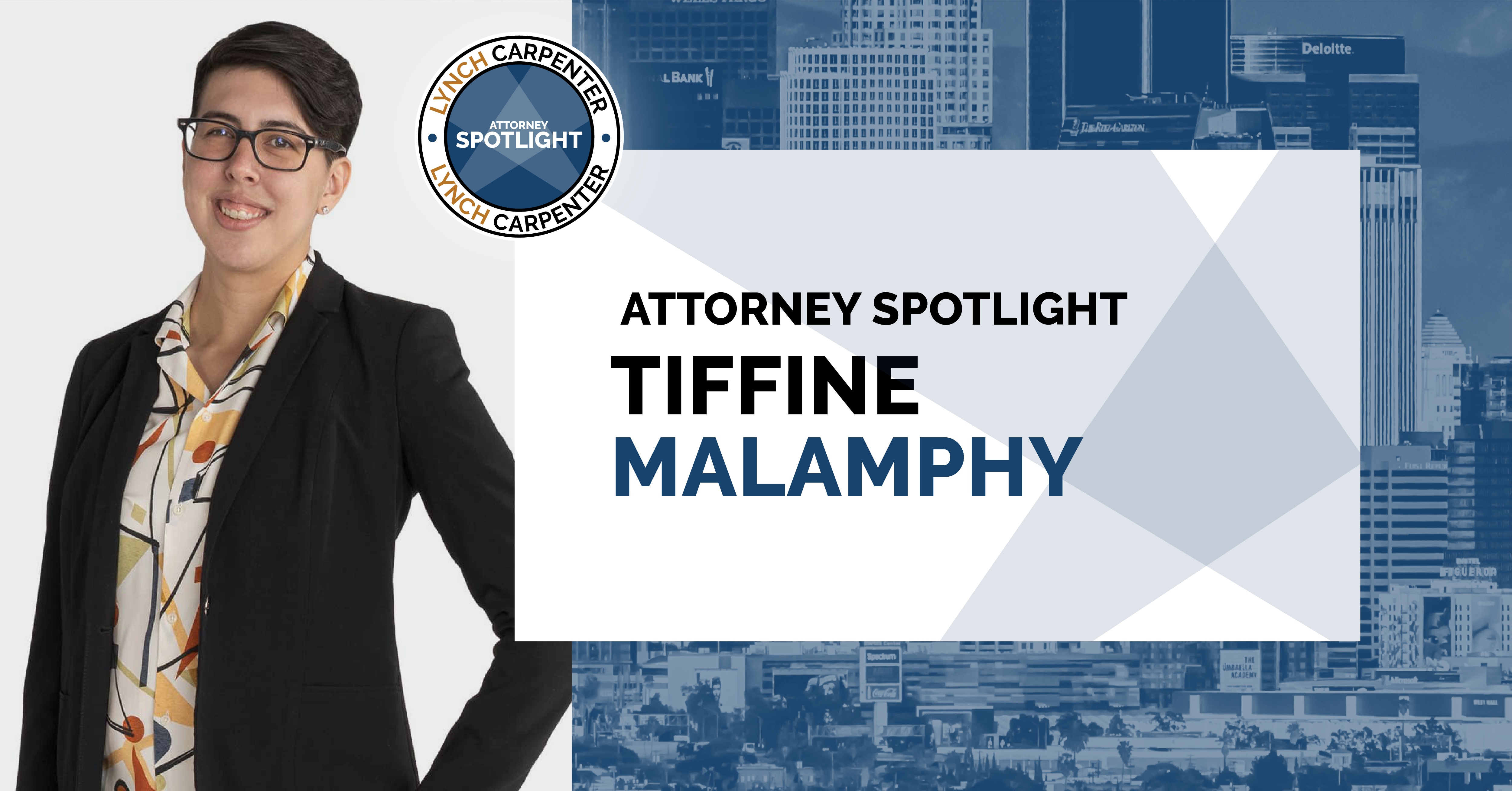
Q&A WITH TIFFINE
Why did you become a lawyer?
I sort of fell into it. When I was getting ready to graduate college, I knew I wanted to continue my education and do something that would help people. My degree is in psychology but after some thought, I decided that being a therapist was not for me. After ruling out grad school, being a lawyer seemed like an active way I could help fix people’s problems. Practicing law has been a great experience; it’s an area of constant development.
Most memorable court room experience?
Before civil litigation, I was a criminal defense attorney. Once, the prosecution withdrew a plea deal and forced my client to go to trial so that a new prosecutor could get trial experience. It was unfair but, unfortunately, completely within the prosecution’s prerogative to do so. Thankfully, after arguing all the facts in my client’s favor, the jury acquitted my client of certain allegations that lead to a lighter sentence than the prosecution was seeking. I won’t forget the look on the prosecutor’s face after delivering my opening when he realized my client and I were not going down without a fight.
What are 3 things you couldn’t survive without?
Iced lattes, my record collection, and cheesesteaks.
Favorite Musician or Band?
I listen to music a lot and love discovering new artists, so I have too many to pick just one.
Favorite thing to do on the weekend?
If I’m not obsessing over some video game, I like exploring the streets of LA. The city is full of hidden gems you won’t find driving around.
How long have you been an Attorney at Lynch Carpenter?
I joined the firm in June 2021. It is a pleasure to work with such a great group of sharp minded professionals as we even the playing field for our clients.
PREVIOUS ATTORNEY SPOTLIGHTS
Spotlight: Tiffine Malamphy
April 29, 2022
Spotlight: Patrick Donathen
March 29, 2022
Spotlight: Nicholas Colella
February 17, 2022
Spotlight: Jamisen Etzel
March 15, 2021
Spotlight: Pamela Miller
January 15, 2021
Spotlight: Eddie Kim
August 17, 2020
Spotlight: Kelly Iverson
May 21, 2020
Spotlight: Patrick Donathen
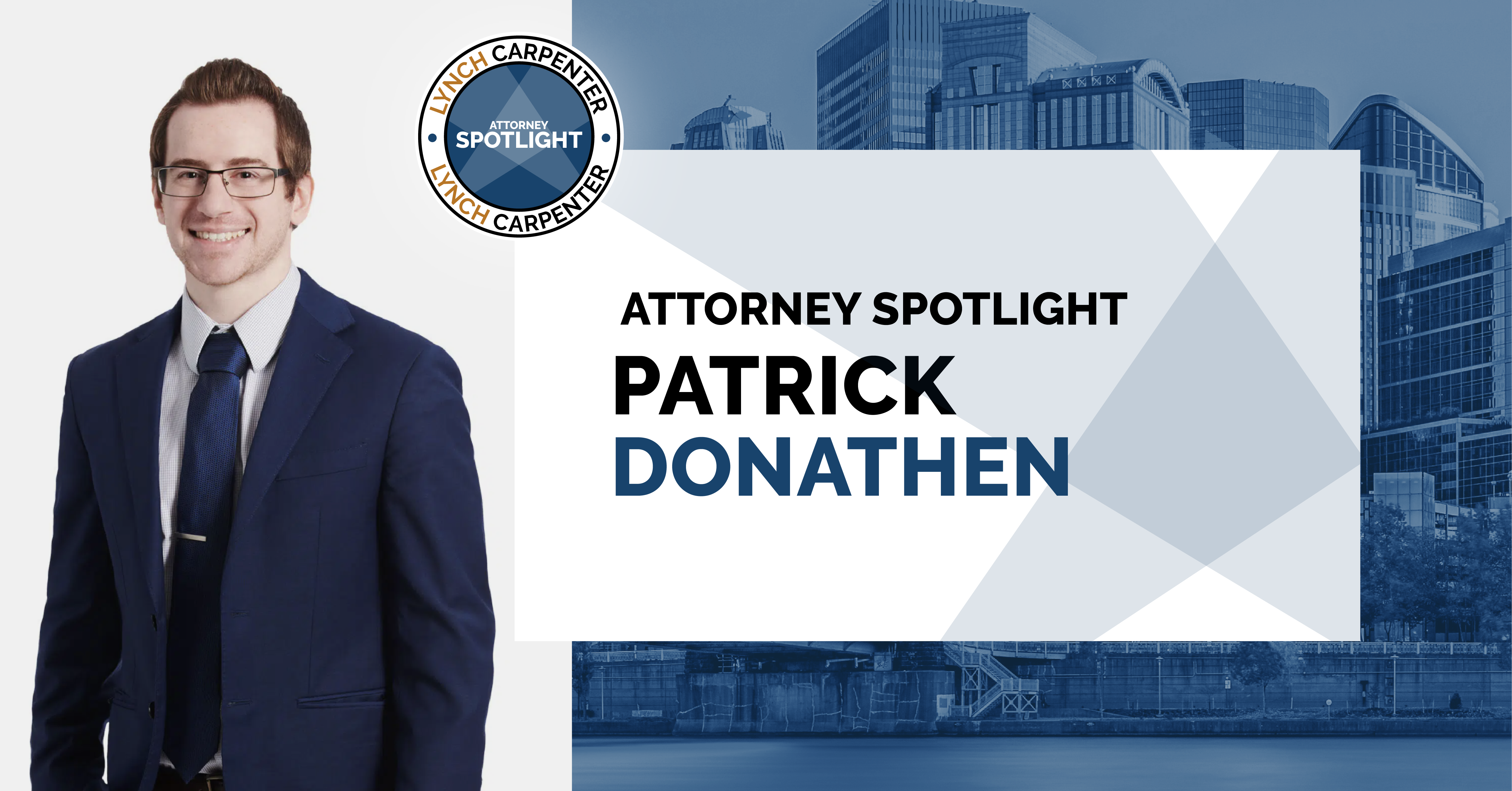
Q&A WITH PATRICK
Why did you become a lawyer?
I always joke that I was destined to become a lawyer because I was raised by one (my dad); so, from a very young age I was already answering “yes or no” questions as “it depends.” But in all seriousness, I became a lawyer because I am very analytical, like to debate, and love to learn. Outside of the law, there are very few professions that allow you to do all three every day.
Most memorable court room experience?
My first oral argument is my most memorable court room experience because of its unusual circumstances. I was arguing our brief in opposition to a defendant’s preliminary objections in state court, but because of the Covid-19 pandemic, the argument was over zoom. So instead of going to court, there I was, in my office, doing a court argument in a blazer and jeans. Very few attorneys can say they did their first oral argument in jeans!
What are 3 things you couldn’t survive without?
My family, coffee (lots of coffee), and a nice glass of bourbon.
Favorite Musician or Band?
This is a tough one. But according to Spotify, it’s Taylor Swift.
Favorite thing to do on the weekend?
After a long week at the office, I like to unwind by cooking with my girlfriend, binge watching a T.V. show, spending time outside (golfing, running, or hiking), and (if it’s football season) watching the Buffalo Bills with a fresh bowl of chicken wing dip.
How long have you been an Attorney at Lynch Carpenter?
I have been with the firm since the summer of 2020. I began as a summer associate in 2020, worked as a law clerk during my final year of law school, and began as a full-time associate in the fall of 2021.
PREVIOUS ATTORNEY SPOTLIGHTS
Spotlight: Tiffine Malamphy
April 29, 2022
Spotlight: Patrick Donathen
March 29, 2022
Spotlight: Nicholas Colella
February 17, 2022
Spotlight: Jamisen Etzel
March 15, 2021
Spotlight: Pamela Miller
January 15, 2021
Spotlight: Eddie Kim
August 17, 2020
Spotlight: Kelly Iverson
May 21, 2020
Spotlight: Nicholas Colella
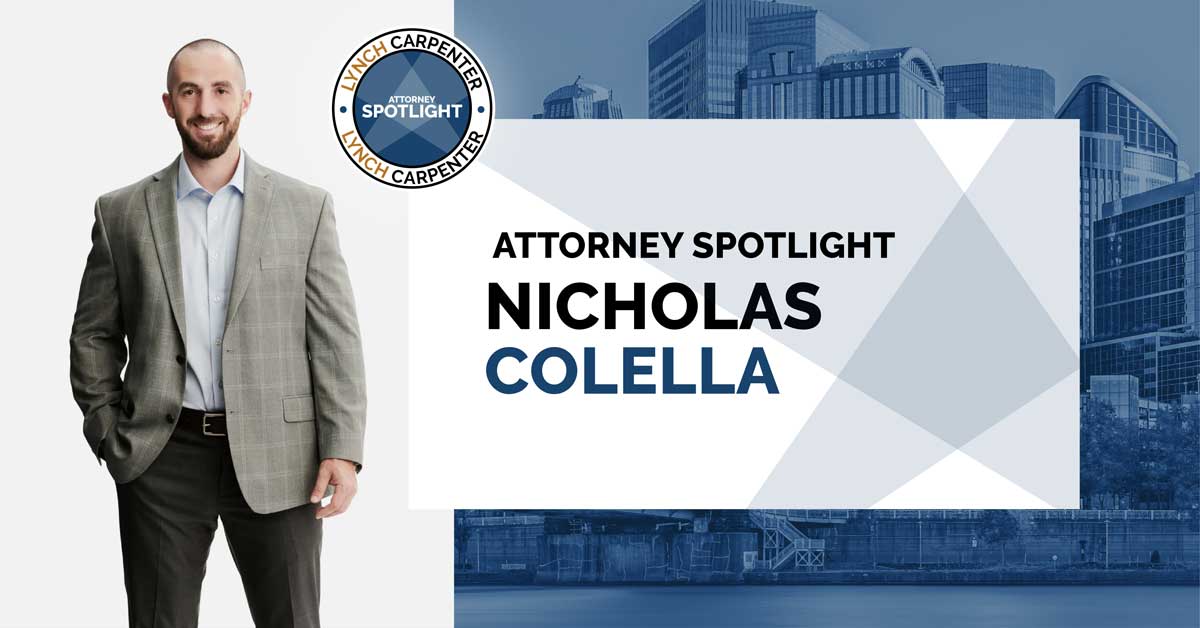
Q&A WITH NICHOLAS
Why did you become a lawyer?
I’ve always been an analytical thinker and enjoy being in the “gray area” working my way out. Being an attorney seemed like a natural fit, and so far, it has been. I also recognized early on the benefits of understanding the law, generally, and how it can be beneficial in everyday life even outside of work. What they didn’t tell me in law school, though, was how many of my friends and family would be reaching out with legal questions!
Most memorable court room experience?
My very first experience in the court room will always be the most memorable. I remember building it up so much in my head that by the time the hearing came, I thought it was going to be like an episode of Perry Mason where both sides start yelling then someone in the gallery confesses to murder. Halfway through the argument, though, it turned into more of a casual conversation with the Judge rather than the “argument” I anticipated. Once that happened, the experience seemed very natural as though I’ve been doing it for years.
What are 3 things you couldn’t survive without?
My family. I’ve been blessed with a very close family who have all supported me throughout my life in every decision I made. The outdoors. There’s no better place for me to clear my head and get my thoughts organized. That’s where a majority of my big “aha!” moments happen both for work and in life. Food. Specifically, a nice ribeye.
Favorite Musician or Band?
This is a tricky one because I enjoy all different genres of music depending upon what mood I’m in or what I’m doing.
Favorite thing to do on the weekend?
I try to get outside as much as possible. It helps me unwind after being in front of the computer all week. When it’s warm outside I’m usually golfing or having cookouts with family and close friends. In the colder months I’m likely hunting or watching football.
How long have you been an Attorney at Lynch Carpenter?
I was a Summer Associate in 2015 and really enjoyed working with the group of attorneys in the firm, many of whom are still here today. I also thought the legal concepts that the firm grappled with were very interesting and, in a way, exciting. I rejoined the firm in early 2020 and it reaffirmed those two beliefs. It’s a continuous intellectual challenge and very rewarding.
PREVIOUS ATTORNEY SPOTLIGHTS
Spotlight: Tiffine Malamphy
April 29, 2022
Spotlight: Patrick Donathen
March 29, 2022
Spotlight: Nicholas Colella
February 17, 2022
Spotlight: Jamisen Etzel
March 15, 2021
Spotlight: Pamela Miller
January 15, 2021
Spotlight: Eddie Kim
August 17, 2020
Spotlight: Kelly Iverson
May 21, 2020
Spotlight: Kelly Iverson
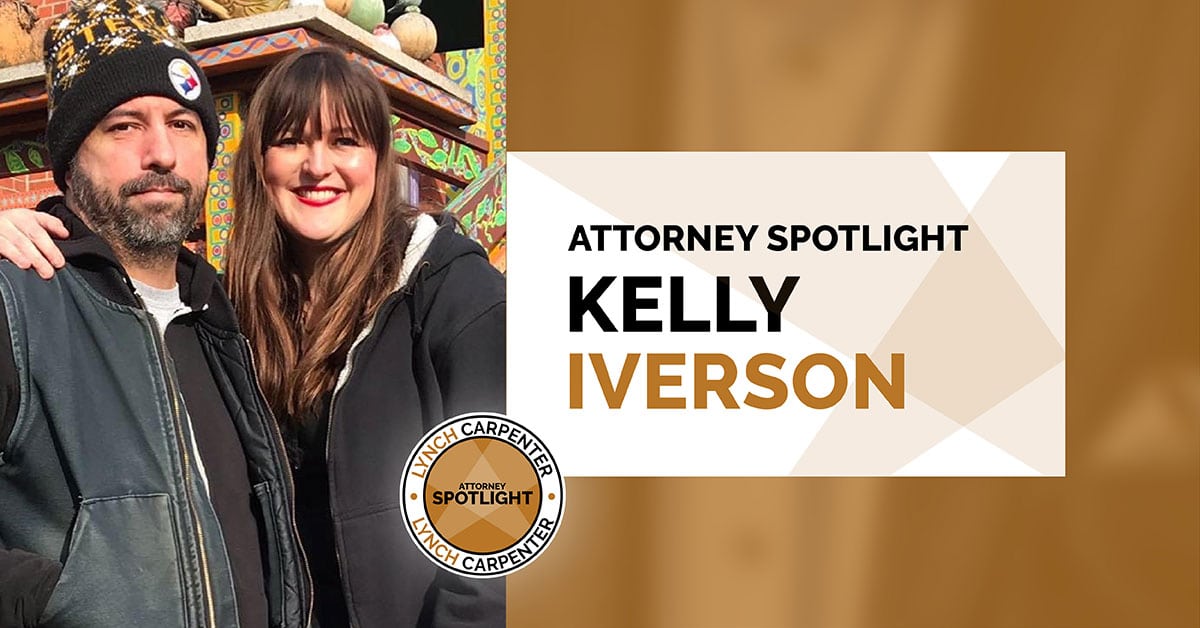
Q&A WITH KELLY
Why did you become a lawyer?
I wish I could say that I always knew I wanted to be a lawyer, but that’s not true. My friend invited me to Penn State when I was a Junior in college to take a practice LSAT for free and I did alright without studying, which is the first time I ever thought about it. After working for five years in insurance I figured I’d take the LSAT for real and apply. While not a long-planned decision, it was a great one!
What are three things you couldn’t survive without?
My family, coffee, and my iPhone.
Favorite musician or band?
I am still stuck in my late 1990’s punk/emo phase, but the Beastie Boys will always have my heart.
Favorite thing to do on the weekend?
You’ll find me on the sidelines at softball and hockey for my kids on most weekends. I also love going out for dinner and drinks (I’m partial to IPAs) with my husband.
Most memorable court room experience?
My very first (bench) trial where I served as lead trial counsel in a medical malpractice and obtained a verdict for my client for the maximum statutory recovery allowed.
PREVIOUS ATTORNEY SPOTLIGHTS
Spotlight: Tiffine Malamphy
April 29, 2022
Spotlight: Patrick Donathen
March 29, 2022
Spotlight: Nicholas Colella
February 17, 2022
Spotlight: Jamisen Etzel
March 15, 2021
Spotlight: Pamela Miller
January 15, 2021
Spotlight: Eddie Kim
August 17, 2020
Spotlight: Kelly Iverson
May 21, 2020
7th Circ. Surprises By Keeping BIPA Suits In Federal Court
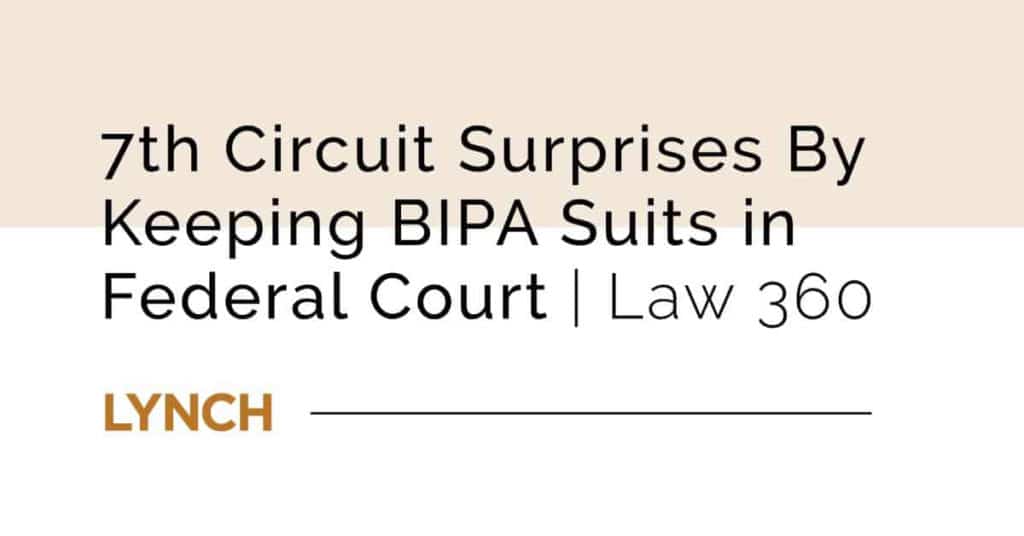 Law360 | May 6, 2020 | Celeste Bolt
Law360 | May 6, 2020 | Celeste Bolt
The Seventh Circuit significantly changed the landscape of biometric privacy litigation Tuesday when it held that federal courts can hear claims over whether defendants violated Illinois’ landmark biometric law by collecting such data without informed consent.
Its ruling answered a question that had loomed large over the booming crop of Illinois Biometric Information Privacy Act lawsuits — and come out differently than many federal district courts that have booted BIPA suits as alleging mere procedural violations without harm.
Attorneys from both the plaintiff and defense bars say they’re relieved to have an answer to a standing fight that forced them into what Chief Judge Diane Wood referred to as a “role reversal,” with companies accused of violating the law arguing federal standing existed when plaintiffs said otherwise.
The “bombshell” decision could even prompt input from the nation’s top court as the Seventh Circuit’s ruling deepens a circuit split on the issue, said John M. Fitzgerald, a Chicago-based partner at Tabet DiVitto & Rothstein LLC and author of a recently published book on BIPA.
A panel of the appellate court held Tuesday that former Compass Group USA Inc. employee Christine Bryant alleged more than a mere procedural violation when she claimed the company failed to disclose its intentions before collecting her biometric information through a vending machine at work.
Compass’ alleged failure to disclose deprived Bryant of substantive information that she was legally entitled to, and prevented her from giving Compass the type of informed consent BIPA requires, which is a concrete and particularized injury that establishes standing, the panel said.
That finding is in line with the Ninth Circuit’s similar ruling in Patel v. Facebook Inc, in which it found Facebook’s alleged BIPA violations constituted an injury-in-fact, but marks a departure from the Second Circuit’s conclusion in Santana v. Take-Two interactive Software Inc, in which the court held that plaintiffs lacked Article III standing without alleging private data could be disseminated or misused.
“If I was Ms. Bryant, I’d file a certiorari petition on this issue,” Fitzgerald told Law360. “It affects a very large number of lawsuits all across the country, and we hav ea clear circuit split of Article III standing.”
Much-Needed Clarity
The Bryant ruling makes BIPA standing requirements for federal court consistent with those for Illinois state court, and the Seventh Circuit’s reasoning is sound give that the BIPA law is somewhat unorthodox, said Todd Rowe, a partner at Tressler LLP.
“Fundamentally, because this statute is so unique, [that is] why we’re seeing this struggle,” Rowe said. “ultimately, I think the Seventh Circuit had to go there.”
Most privacy laws require some sort of breach, or real-world harm, and BIPA is unique to the extent you don’t need that breach, Rowe said.
The Illinois Supreme Court in 2019 determined that a mere violation of the state’s biometric privacy law is enough to confer standing without proof of actual harm in Rosenbach v. Six Flags.
“The failure to give notifications is the damages. The damages are almost built in,” he said. “State courts had it right from the start.”
Through the ruling may seem like more of a victory for defense attorneys who would prefer to litigate these cases in federal court, it also comes as a relief to plaintiffs’ attorneys like Lynch Carpenter LLP partner Katrina Carroll, who has feared the suits could go on for months in one forum only to have a judge decide it’s not the right court to hear the case.
“We’re thrilled we have clarity now and know where we can proceed with these cases,” she told Law360. “Federal court is the place to be, and we’re comfortable litigating there.”
Before the Seventh Circuit weighed in, plaintiffs were finding themselves in a “very precarious situation,” Caroll said.
“As [a plaintiff], I’m not going to stand up in front of a federal court and argue that I don’t have the standing to be there,” she said.
Fitzgerald agreed that it feels “counterintuitive” to describe Tuesday’s ruling as a win for the defense bar, even though they’re been in a position where they must argue their opponents’ claims have standing to stay in or move to federal court.
“it’s interesting that this victory for the defense bar occurs in the context of a court saying that violations fo BIPA do create injuries-in-fact that are sufficiently concrete to create Article III standing,” Fitzgerald said.
A ‘Strategic Option’ for Defense Attorneys
To Benesch Friedlander Coplan & Aronoff LLP defense attorney Mark Eisen, the Bryant decision was somewhat unexpected, given that district courts have by and large found similar claims lacked Article III standing and, based on prior Seventh Circuit authority, related to the collection of personal information.
“This decision did not really make an effort to separate those decisions from the district courts or the decision from the Second Circuit with any significant analysis, maybe because the Seventh Circuit views biometrics being treated somewhat differently,” Wisen said.
As a practical matter, plaintiffs in BIPA cases aren’t alleging something wrong was done, he said.
“They’re saying, ‘I knew what I was doing, but you should have given me certain information before I did that,” Eisen said. “To find that was enough under [Spokeo Inc. v. Robins], I think is fairly unexpected. But we’ll take it.”
The decision subjects BIPA cases— which are often brought on behalf of a putative class — to a more stringent analysis under Federal Rule of Civil Procedure 23, which governs class actions, and brings a strategic option to the table that many plaintiffs’ lawyers may have been looking to avoid, he said.
For example, the Seventh Circuit has taken a more defense-friendly view of union issues in the BIPA context, where some state authority hasn’t, Eisen said.
“It seems to be one of those relatively rare circumstances where the defense is certainly benefiting from the Seventh Circuit’s guidance on this, which has not always been defense-friendly,” he said.
Duty to Public Vs. Individuals
While the Seventh Circuit found Bryant’s proposed class claim under Section 15(b) of BIPA — which requires, among other things, a written release before biometric information is collected — shouldn’t have been sent back to state court, it found she lacked standing to pursue her claims under Section 15 (b) of the statute, which requires a publicly available data public retention schedule and guidelines for permanently destroying biometric information.
The court held Compass’ duty under that section of the statue is to the public generally, not the specific individuals whose biometric information it collects, and Bryant alleged no particularized harm for the violation of that aspect of BIPA, the panel said.
But it was a distinction Fitzgerald found surprising, given the purpose of the laws as a whole, he said.
“15(b) and 15(b) were generally intended to protect the same rights. It’s certainly a surprising element of the ruling,” he said.
Rowe, however, said it makes sense given that the opinion was largely driven by the need to get Bryant’s consent or the opportunity to consent.
Carroll agreed, saying the court concluded that if Bryant had all the relevant information, she might have chosen to buy snacks from Compass’ biometric vending machines.
“That to me is what swayed them… as opposed to the general injury to the public at large,” she said.
And while the distinction does raise the question of whether to pursue an alleged Section 15(a) violation separately in Illinois state court, where a crafty plaintiff could attempt to make a “removal proof” claim, it’s not something Carroll said she would explore.
“If there’s now a recognition that the injuries under 15(b) are concrete and particularized… and plaintiffs can seek redress for them, that’s what we’re more interested in,” she said.
Law360's Benefits Editorial Advisory Board
Law360 announced the members of its 2019 Benefits Editorial Advisory Board.
“The purpose of the editorial advisory board is to get feedback on Law360’s coverage and gain insight from experts in the field on how best to shape future coverage.”
Lynch Carpenter attorney Edward W. Ciolko was named a member of this years’ board.
“Ed Ciolko specializes in federal statutory claims involving mismanagement of pension funds and fees (ERISA), violation of real estate transaction protections (Real Estate Settlement Procedures Act/discriminatory & predatory lending), antitrust market monopolization/generic drug blockage and overtime/worker misclassification claims (Fair Labor Standards Act) as well as state fiduciary breach, student predatory lending and insurance/reinsurance related actions.”

 Law360 announced the members of its 2019 Benefits Editorial Advisory Board.
Law360 announced the members of its 2019 Benefits Editorial Advisory Board.
“The purpose of the editorial advisory board is to get feedback on Law360’s coverage and gain insight from experts in the field on how best to shape future coverage.”
Lynch Carpenter attorney Edward W. Ciolko was named a member of this years’ board.
“Ed Ciolko specializes in federal statutory claims involving mismanagement of pension funds and fees (ERISA), violation of real estate transaction protections (Real Estate Settlement Procedures Act/discriminatory & predatory lending), antitrust market monopolization/generic drug blockage and overtime/worker misclassification claims (Fair Labor Standards Act) as well as state fiduciary breach, student predatory lending and insurance/reinsurance related actions.”




